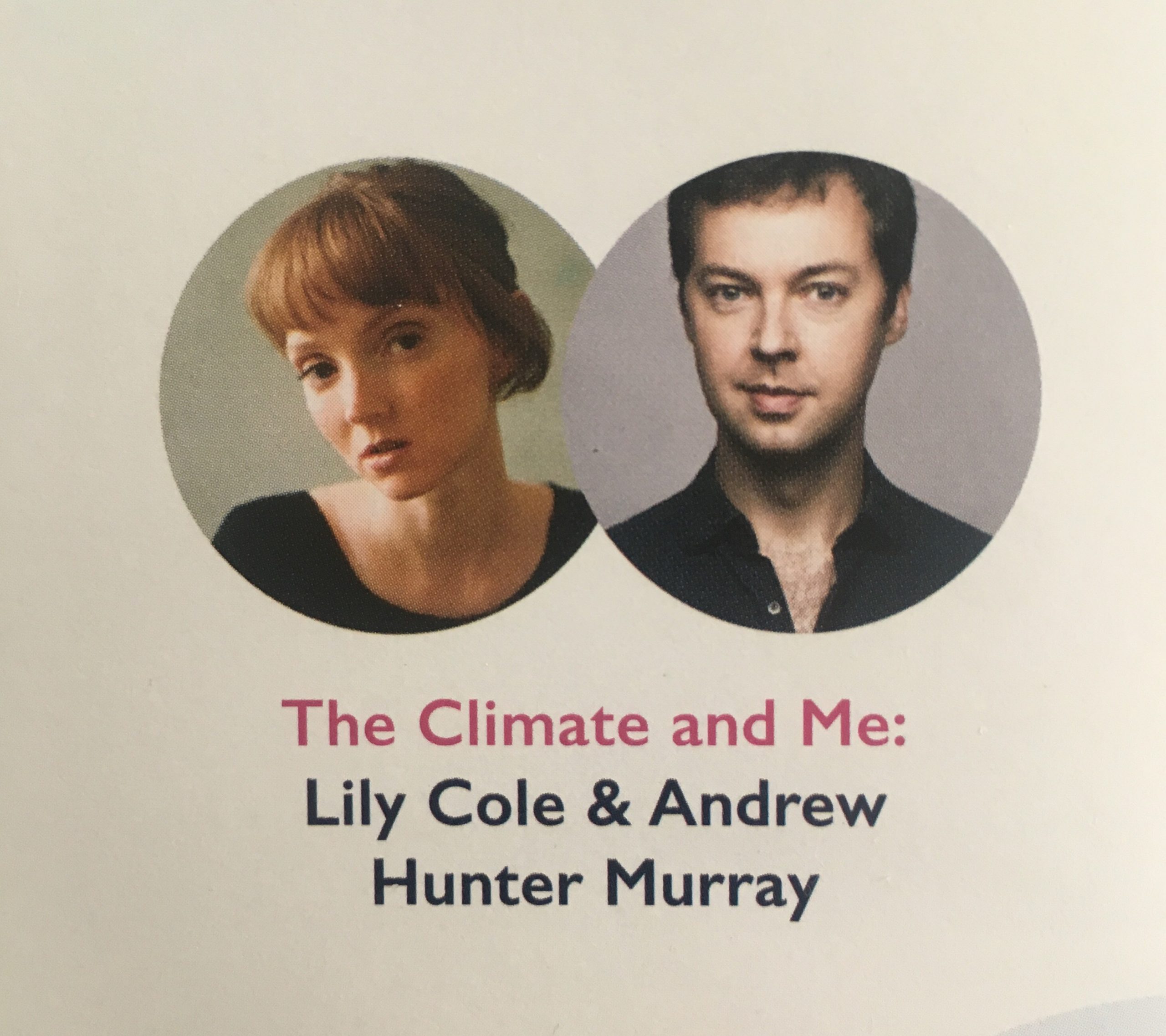The state of our climate today has created a chaotic combination of emotions: hope, despair, passion and confusion. How can we navigate such uncertain times?
At the Barbican centre last weekend, Bella Lack, 17-year-old environmentalist, interviewed actress and activist Lily Cole and writer and comedian Andrew Hunter Murray about their thoughts on the climate crisis.
They discussed an array of thought-provoking topics, from the conflict between individual and government responsibility, to the problematic polarisation taking shape in society.
Wisdom from the climate change speakers
Lily Cole, as well as being a model and actress, founded Impossible, a platform designed to encourage new ways of thinking and behaving in order to protect the planet.
She describes her forthcoming book Who Cares Wins as an “ode to optimism”, in order to elevate the power of hope amidst such unrest.
Andrew Hunter Murray’s novel The Last Day, however, could be described as dystopian. He expresses the concern that the book is gradually edging its way into the non-fiction genre, due to its frightening relevance today. The anxieties about our world and future come true in this novel.
Here, Andrew quotes author Ursula K Le Guin, agreeing that “science fiction is about the here and now”.
His book set in 2059, when the world has stopped spinning so half is left in sunlight and the other in endless night. How will people survive in such turbulent times?
Andrew writes for QI, BBC show, and co-hosts the No Such Thing as a Fish podcast. He explains that the topics in both of these have become more and more about the environment.
He briefly explains how carbon emissions are impacting earthworms, also known as ‘global worming’, which receives a laugh from the crowd. Andrew says that he started to realise, through the podcast that “all species are being mucked about with by us”. Ultimately, we have a lot to answer for.
Striving for sustainable fashion
Through her career in modelling, Lily Cole has an insight into the nature of supply chains within the fashion industry. From this perspective, she felt a looming sense of conflict and responsibility.
She talks about making change happen from within, rather than making enemies from without. So, she started working with ethical brands to practise what she preaches.
“Fashion isn’t just clothes, it’s the culture we live in”, says Lily. That’s why it is so important to target this industry – to contribute to the larger movement of building a more sustainable world. Could sustainable fashion help to promote a sustainable culture?
Individual vs. government responsibility
There is a conflict between taking the initiative to make personal changes, versus relying on higher forces to implement compulsory sustainable initiatives.
Should people stop buying from unsustainable brands, in order to hold them accountable, or continue as normal and wait for businesses to take the upper hand and make sustainability mandatory?
Andrew Hunter Murray describes his struggle to motivate himself to make lifestyle changes, saying: “I would love to be banned from doing things by the government”.
For instance, he can’t personally resist eating meat altogether, but simultaneously acknowledges the impact animal agriculture has on the environment. He understands that scrapping meat from his diet could cut his carbon footprint by approximately 40%.
In the same breath, he recommends the Marks & Spencer vegetarian chicken nuggets, having been surprised at how tasty they are. Small changes are better than none at all, right?
Lily agrees: “We definitely need government policy as it’s hard for individuals to navigate”. But she follows this with a very valid point: “Individuals are part of the government”. She suggests people need to signal to businesses what changes they want to see happen.
“There are social business movements in place, making their way into the mainstream narrative, but laws also need to be in place to complement this”, she adds.
When an audience member expresses her concern about excessive regulation, Andrew says “there are examples of regulations improving quality of life”.
But because businesses are owned by individuals, Lily explains, the media narrative isn’t always welcoming of red tape.
So the push for change has to work both ways, as the speakers conclude that politics drives culture and vice versa.
Lily quotes the author Richard Buckminster Fuller: “We are the crew of spaceship earth and it does not come with a manual”. We may have to create our own rule-book. But the most productive way to steer this ship, Lily advises, is through optimism.
Positive vs pessimistic
The polarisation that is taking shape as a result of disputes about climate awareness and activism is particularly problematic.
At times, there is a sense of deep division amongst the public regarding the environmental emergency.
What if disruptive protest is actually crippling the campaign for change, rather than encouraging people to get on board?
Lily Cole comments: “I support Extinction Rebellion, but there is a battle between whether it’s better to change a system within or without”. For example, forming a dialogue with politicians could be more productive than being angry from the outside.
On the flip side, she says that lobbying power can come from school climate strikes, which are currently the biggest threat to the oil industry.
Lily believes: “Protest is critical, but positivity is important”. Her book is about the hopeful trends and changes happening in business, politics and society. She wants people to recognise that there are lots of people in organisations focused on finding solutions for a more sustainable future.
Instead of criticising the world we have created and calling for the system to be overthrown, we need to evolve the one we have now.
Technology’s role in sustainability
Andrew Hunter Murray is passionate about the need to use technology to take necessary climate action, arguing that “we can’t get out of the crisis without technology”.
He explains that we must have enormous technological advances, as so many millions of tonnes of carbon need to be sucked out the atmosphere to help the climate.
Lily Cole agrees “Technology can be amazing and has the capacity to help us change the game”. But, she also has her doubts: “With possible social and environmental costs of tech, it is one slice of a much more complicated pie”.
She mentions the idea of investing in “risk aversive” methods, such as energy through nature, which are cheap, immediate and quick win ways to solve the crisis.
The solutions could come from reconnecting with ourselves, Lily theorises, as “we are nature…we talk about it like it’s something out there…we need to re look at our relationship with nature again”.
Lesser of the two evils
Many people are put off by the fact that all our actions have implications for the environment, so why bother changing any at all?
For example, the argument around artificial leather known as ‘pleather’ considers the impact manufacturing fake leather has on the planet. Is it even better than actual leather, some ask?
Lily says: “Pleather is the lesser of the two evils, but there are natural products that are less evil”.
Realistically, there will always be a ‘what if’, along with many complexities to consider with regards to sustainable practice. But the more we talk and actually try things out, the more educated we become.
How to reduce your carbon footprint
The lasting message from the interview was this: the single most significant way to reduce your carbon footprint is to cut your meat and dairy intake.
But it’s not that simple. One thing is clear: we all have to face the ‘climate and me’ dilemma today. Exactly how we go about doing that is set to be a never-ending obstacle course.






